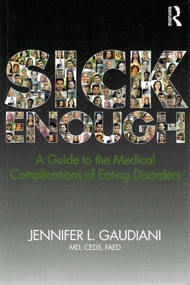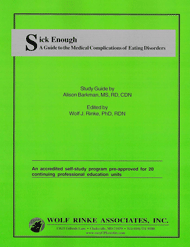|
Sick Enough: A Guide to the Medical Complications of Eating Disorders
This CPE activity provides a comprehensive, accessible review of the medical issues that arise from eating disorders by bringing relatable case presentations and a scientifically sound, engaging style to the topic. It will enable you to improve medical diagnosis and treatment, motivate recovery, and validate the lived experiences of individuals of all body shapes and sizes, while firmly rejecting a dieting culture. More specifically you will discover how to:
- Care for patients who do or do not meet DSM-V criteria for eating disorders.
- Identify the side effects associated with various eating disorders.
- Evaluate lab values that may be affected by eating disorders.
- Implement intuitive eating and health strategies for different populations.
Share with a friend and Save! Click here for important information about
sharing.
To order an ADDITIONAL Reporting Form click below:
|
T342F
|
20 CPEUs |
REPORTING FORM |
|
|
Sick Enough: A Guide to the Medical Complications of Eating Disorders
© 2024 Wolf Rinke Associates. All rights reserved for this self-directed accredited learning activity. Reproduction in whole or part without written permission, except for brief excerpts, is prohibited.
LEARNING OBJECTIVES
As a result of studying and applying the concepts presented in this
book, you will be better able to:
- Recognize clients/patients can have significant eating disorder behaviors who may not meet DSM-V criteria for an official diagnosis of an eating disorder.
- Propose how to care for such patients who do or do not meet DSM-V criteria for eating disorders.
- Discuss and identify anorexia nervosa, bulimia nervosa, and binge eating disorder.
- Differentiate between anorexia nervosa and atypical anorexia nervosa.
- Identify the different purging methods used by those with bulimia nervosa.
- Educate clients on how the body goes into hibernation from excessive restriction.
- Evaluate eating disorders in different populations including all ages and genders, as well as special patient populations.
- Discuss the connection between an eating disorder and a patient’s menstruation.
- Recommend other healthcare practitioners who play a vital role in the care of eating disorders including a speech-language pathologist and therapist.
- Identify the medical complications that occur with an active eating disorder.
- Discuss the side effects of bulimia nervosa including acid reflux, damaged lower esophageal sphincter, and edema.
- Assess the difference in personality traits typical of various eating disorder types.
- Evaluate lab values that may be affected by eating disorders.
- Recognize refeeding syndrome.
- Define intuitive eating and health at every size.
- Differentiate between typical picky eating in kids and avoidant restrictive food intake (ARFID).
- Recommend a plan of action for a client suffering from orthorexia.
- Identify the ways a person may have orthorexic tendencies.
- Assess how eating disorders may interfere with fertility.
- Apply knowledge in counseling a pregnant woman with a history of an eating disorder.
- Assist a diabetic patient with an eating disorder.
- Differentiate between an athlete with an eating disorder vs. an athlete who needs proper education in sports nutrition.
ABOUT THE AUTHOR
Jennifer L. Gaudiani, MD, CEDS, FAED is a Board-Certified internal medicine physician, known nationally and internationally for her work on the medical complications of eating disorders. Her outpatient medical practice, the Gaudiani Clinic, cares for individuals of all genders, shapes, and sizes, from around the United States.
ABOUT THE AUTHOR OF THE STUDY GUIDE
Alison Barkman, MS, RD, CDN is a registered dietitian and certified intuitive eating counselor with over 10 years of experience in a variety of settings including clinical nutrition, private counseling, and as an adjunct professor of nutrition at Long Island University, Brookville, NY, and Adelphi University, Garden City, NY.
Alison works privately with clients on intuitive eating and non-diet approaches to nutrition. She helps her clients break free from chronic dieting and disordered eating. Alison’s goal is to help children and adults stop following food rules, feel positive about their bodies, and actually enjoy food.
Alison’s podcast, Speaking of Hungry, explores rejecting diets and embracing food freedom. On the podcast, she interviews experts in the field of disordered eating, intuitive eating, and eating disorders. She is an anti-diet social media influencer and presents on intuitive eating to a variety of audiences.
Alison earned a Bachelor of Science in speech communications from the State University of New York at Plattsburgh. She returned to school and earned a Master of Science in nutrition with a concentration in nutrition and exercise science from Long Island University (LIU) in Brookville, NY.
Alison’s website is www.alisonbarkman.com and she can be found on Facebook and Instagram at @AlisonBarkmanRD.
Return to the top of page
If you prefer to order by phone, mail
or fax click below
or click here to contact us with
other questions.
For information about our other products and
services return to the sidebar at the top of the page.
|
|
|


